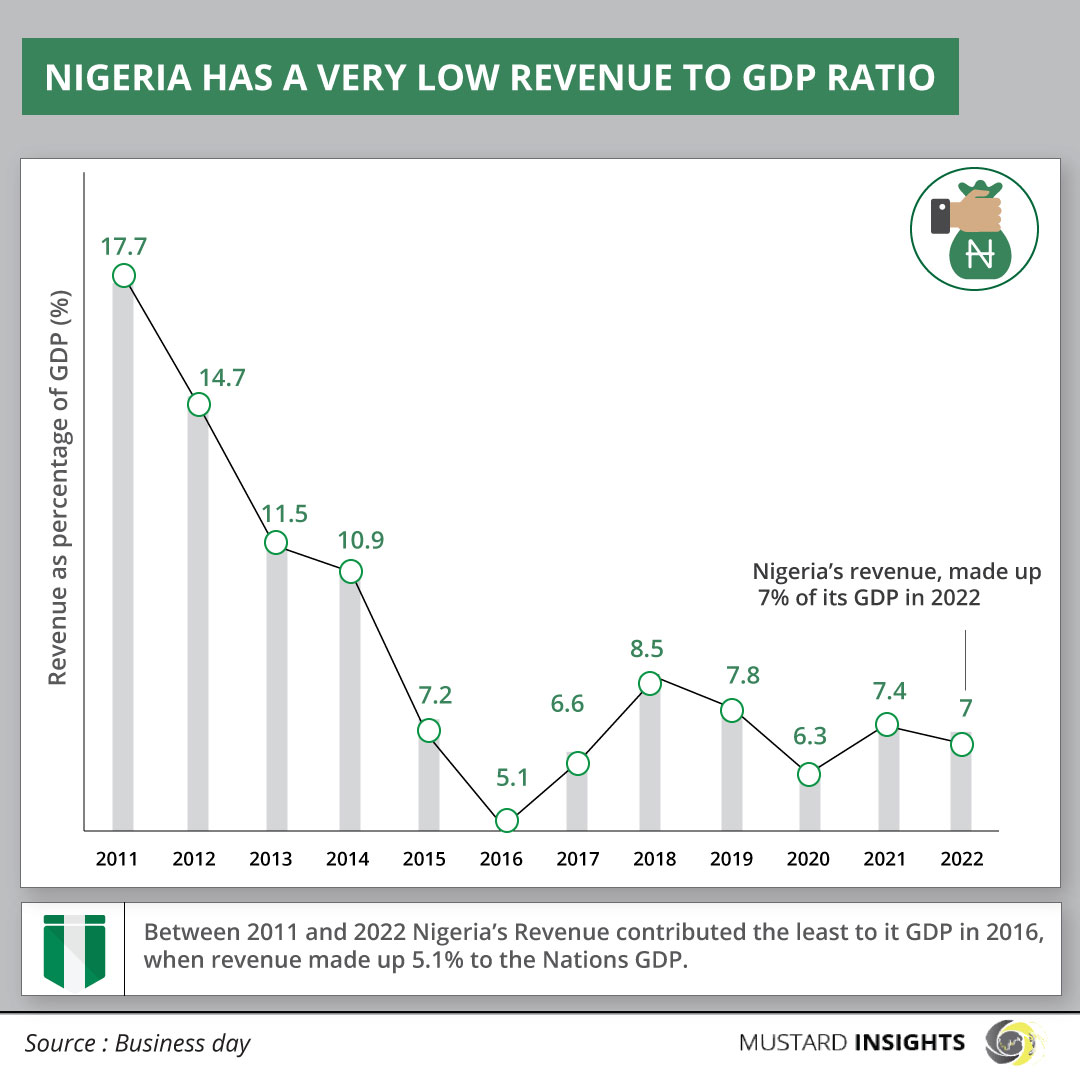
Nigeria continues to suffer low revenue to Gross Domestic Product (GDP) ratio amid marginal increase in revenue in 2022, according to the report released by Business Day.
Nigeria’s economic instability continues to be at the forefront of its capacity to generate revenue and Gross Domestic Product (GDP) to boost its economy.
The International Monetary Fund (IMF) has said that Nigeria’s revenue is still not where it needs to be, noting that the country collects the least amount of revenue at about 7 to 8% of GDP among all emerging economies.
Nigeria records less than 12% revenue to GDP ratio, which makes it very difficult to explore opportunities and imperatives for businesses in the country. This makes it difficult to get improvement on social indicators with such low levels of revenue to GDP ratio.
According to Buhari, Nigeria generated an estimate of 10.13 trillion NGN in 2021; which was available to fund the 2022 budget. Despite the country’s enormous resources, it has the lowest revenue to GDP ratio in Africa, according to the World bank in 2021. Although Nigeria recovered from the pandemic, which paralyzed most economies of the world, revenue to GDP ratio grew from 6.3% to 7.4%.
Breakdown and Key Metrics
According to data by Business Day, Nigeria’s revenue contribution to GDP fluctuated between highs of 17.7% and lows of 7% between 2011 and 2022. The figures showed that revenue to GDP ratio declined year-on-year between 2011 and 2016, followed by uptrend between 2016 and 2018. consecutive Year-on-year declines set in again between 2018 and 2020 followed by an increase in 2022 and decrease in 2022.
In 2011, Nigeria’s revenue contribution to GDP was 17.7% and declined for five years in a row to 14.7% in 2012, 11.5% in 2013, 10.9% in 2014, 7.2 in 2015 and 5.1% in 2016. The revenue to GDP ratio of 2016 is the lowest revenue contribution to GDP between 2011 and 2022.
Nigeria recorded increases in revenue to GDP ratio in 2017 and 2018, with revenue accounting for 6.6% and 8.5% respectively. Revenue to GDP contribution in 2019, 2020 and 2021 were 7.8%, 6.3% and 7.4% respectively.
Currently, Nigeria’s revenue to GDP ratio stands at 7%.
Other Insight
The Nigeria Federal Government incurred a sum of 4.22 trillion NGN on debt servicing in 2021 which gulped about 96% of its total revenue, and with the International Monetary Fund’s (IMF) projection, the country’s debt servicing may take up about 92% of its revenue in 2022.
Nigeria’s revenue may have plummeted by its deficit balance of payment because its import levels still exceed its exports. That said, the alarming level of debt-to-revenue ratio could also be one factor responsible for the 0.4% decrease in Nigeria’s revenue to GDP ratio in 2022.
Takeaway
Policy reforms oriented to create a conducive environment for the private sector can be pivotal to improve revenue to GDP ratio. These can be through higher access to credit and foreign exchange, a more predictable, workable horizon for macro-economic stability and with less volatility.
Other avenues to improve Nigeria’s revenue to GDP ratio include strengthening tax administration, increasing tax compliance supply using digitization, and broadening the tax base. These can raise the revenue to GDP ratio to levels that are around the regional average.
Impact of Dangote's Oil Refinery on Nigeria's GDP
Thoughts?
We won't share your email address. All fields are required.
